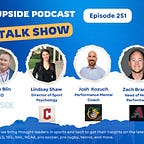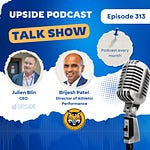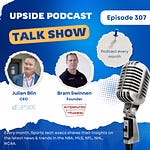Today we have the honor of interviewing a group of MLB practitioners that are experts in mental performance and preparation.
Lindsay Shaw, Director of Sport psychology for the Guardians, an MLB team.
Zach Brandon, Head of Mental Performance and Coach Development, for the Arizona Diamondbacks, an MLB team.
Josh Kozuch, Mental Performance Coach for the Baltimore Orioles, an MLB team.
You can watch the video interview below by clicking on the Youtube link. You can also listen to the audio interview by clicking on the link at the top of the page:
You can also read the full transcript of the podcast interview with Lindsay, Zach, and Josh located at the top of this blog post.
Here are the quotes from the interview with Lindsay, Josh and Zach:
1. How has the approach to mental performance evolved in MLB over the past 5–10 years?
Lindsay Shaw:
“MLB has a very long history of incorporating mental performance. The Guardians, for instance, had someone in my role for over 30 years. There’s this foundational recognition in baseball that hitting is extremely hard, pitching is extremely hard, and the season is incredibly long. That’s why having mental performance support has made sense for decades. It’s about helping players and coaches get through those challenges with expert guidance. And while I’ve only been in baseball for about five years—after working with the Olympic Committee for a decade—what’s been really encouraging to see is how much the sport values mental skills as part of holistic performance.”
Josh Kozuch:
“This is now my third MLB organization in the last 10 years, and the growth has been significant. What I’ve seen is that players are coming in with more exposure—they’ve either worked with someone in high school or college, so we’re not starting from scratch. And what’s really interesting is that now coaches are engaging in mental work too—they’re reading the books, listening to the podcasts, doing the work. It’s no longer just us as specialists holding that space. Coaches are bringing their own high-level playing experience and integrating mental skills into their communication and development approach. Lastly, there’s just more infrastructure—departments like ours didn’t exist in most clubs 10 years ago. Now, nearly every team has at least one dedicated mental performance practitioner, if not an entire department.”
Zach Brandon:
“One of the biggest changes I’ve seen, especially being involved in our draft process over the last several years, is that incoming players already have some experience with mental skills. They’re coming in with their own routines and perspectives—sometimes shaped by college, high school, or even private coaches. So our role has shifted. I often think of us as quality control—we’re helping ensure that what they’re doing is evidence-based, effective, and personalized. We're not just handing out one-size-fits-all tools anymore. There’s more emphasis on individualization, and the circle around players is larger than ever. They’re working with private coaches, mental skills consultants, and we try to understand those relationships and act as an extension of their support system, rather than replacing it. That shift has made the work more collaborative and nuanced.”
2. How important is mental preparation in the MLB?
Lindsay Shaw:
“When you’re playing 162 games, mental fatigue is inevitable. These athletes face unique psychological challenges: the constant travel, relentless schedule, the repetitive pressure to perform—it wears on people. So yes, mental preparation is critical. And when players are competing in an environment where hitting .300—meaning failing 70% of the time—makes you elite, the mental skill of managing failure becomes just as important as any physical skill. Our job is to help them build the emotional agility to recover, reset, and stay in the game mentally over a very long season.”
Josh Kozuch:
“Baseball is data-rich. Players are exposed to scouting reports filled with percentages—what pitch someone might swing at in a certain count, tendencies, zones—it can be overwhelming. Our role is to help them prepare mentally so they can simplify all that information into a plan and go out and compete without paralysis. That collaboration isn’t just with players—it includes hitting coaches, pitching coaches, and managers. It’s a team-wide effort to keep minds clear so bodies can perform.”
Zach Brandon:
“Baseball is unique in that it’s a competition-based sport. Guys train and compete on the same day, often with very little time in between. So our job is not just about long-term development—it’s about ensuring players are confident, focused, and mentally present when the game starts at 6:40 or 7:10. The mental demands are high, and the cognitive load is real. With so much variability—travel, back-to-back games, failures—it’s our job to help them stay mentally adaptable and grounded, night after night.”
3. What are the most effective mental preparation techniques used today?
Zach Brandon:
“We cover the core tools—breath work, meditation, visualization, routines—but to me, the key isn't about adding more techniques. It’s about helping players filter through the noise so they can consistently execute what works best for them. Especially in today’s data-heavy environment, players can get overwhelmed. Sometimes our role isn’t to teach something new, but to remove clutter. Mental performance is a lot like strength training—everyone knows the basics, but few consistently apply them under pressure. We also focus heavily on what we call ‘mental practice.’ Knowing isn’t doing. You can know how to breathe or visualize, but if you haven’t trained it under game-like stress, it won’t hold up. Just like a swing or pitch, these skills require reps. And increasingly, we’re trying to build environments—not just sessions—that reinforce these skills. That means working with coaches and strength staff to embed mental skills into the rhythm of the day.”
Josh Kozuch:
“I’ve seen success by building a mental skills curriculum across the minor league system, where players get foundational training depending on where they are in their development journey. But here’s the catch—it can’t be rigid. Players don’t all progress at the same speed. One guy may get called up before he’s completed the curriculum, and that’s okay. We speed things up or individualize. At the big league level, it’s often less about teaching something new and more about refining what's already there. Many athletes have mental routines—they just don’t label them. Maybe they’re visualizing or setting intentions without knowing it. Our job is to help them identify, strengthen, and own those routines. We’re not force-feeding techniques—we’re pulling things out of them, based on who they are and how they naturally operate under pressure.”
Lindsay Shaw:
“There’s a lot of research validating certain techniques—breath control to regulate the nervous system, cognitive reframing, mindfulness, mental imagery—but what matters most is context. These tools don’t exist in a vacuum. It’s like physical rehab: you can’t give everyone the same protocol. You have to understand the athlete’s mental makeup, experiences, background, and the specific demands of their position or role. At the highest levels, we’re working with players to develop their own philosophy of preparation. How do they prepare mentally for a tough opponent? How do they rebound from a slump? How do they stay connected to their identity when pressure mounts? My job is to help them tune into their own nervous system and develop personalized strategies that support performance, especially in unpredictable, high-stakes moments.”
4. How do you train cognitive skills during injury rehab?
Josh Kozuch:
“Injury rehab isn’t just about fixing the body—it’s about keeping the mind in the game. For long rehabs like Tommy John, we break things down into phases. In the early stages, we focus on building awareness, acceptance, and goal-setting. As recovery progresses, we start working on routines, visualization, and helping them reconnect to their competitive identity. One thing that’s critical is collaboration. I sit down with athletic trainers and strength coaches to build a holistic plan. We talk about what the player will face mentally at each stage—loneliness, fear of re-injury, frustration—and we try to get ahead of those challenges. If we don’t engage the cognitive side, we’re sending a physically-ready but mentally-unprepared player back into a high-pressure environment.”
Lindsay Shaw:
“There’s a real risk in separating mental and physical rehab. We’ve had athletes who were physically cleared but weren’t mentally ready—and the performance breakdowns were immediate. That’s why simulation is so important. We can’t always replicate live game environments, but we can get close. I’ve used video analysis, pitch recognition systems, even VR or elevated heart rate situations to help players stay cognitively connected. Watching video while riding a stationary bike—approximating game stress—is a good example. We’re not just treating anxiety or fear; we’re actively training decision-making, timing, and focus. And sometimes, we’re helping athletes stay emotionally tethered to the game, especially during long, isolating recoveries.”
Zach Brandon:
“One of the most valuable things we’ve done is integrate mental reps into game situations. We had a minor league group rehabbing at our major league facility, and we brought them into a live game to sit behind scouts, read scouting reports, and evaluate in real time. They debriefed afterward. That kind of mental engagement helps bridge the gap between rehab and performance. The other key piece? Conversation. I had a player who came in to do breath work, but ended up spending 30 minutes just talking. He left saying, ‘Hey, we don’t need to do the breathing now—I feel better.’ And I told him, ‘That was the work.’ Sometimes, letting players unload mental tension is more powerful than any technique we planned.”
5. How do you individualize strategies across different player types and cultural backgrounds?
Josh Kozuch:
“You have to be a detective. No two players are the same, so you approach each one with humility and curiosity. I ask questions like: ‘What’s your best performance memory? What helps you reset after a bad game? Who have you worked with in the past?’ Then I observe. I watch how they act in the cage, during meetings, in downtime. You gather information, then build from there. For rookies, it’s about education and exploration. For veterans, it’s more about refinement and support. They often know what works, but maybe they need a reminder or a fresh perspective. Cultural background plays a role too—some guys aren’t comfortable with the word ‘psychologist.’ So sometimes you support them indirectly—through coaches or other staff—by embedding mental work into the overall routine without calling it out.”
Lindsay Shaw:
“We have a large Latin American population, especially in the lower levels, and cultural sensitivity is critical. Some players associate psychology with weakness or trauma, not performance. That’s where relationship-building and nuance come in. Maybe they won’t talk to me directly, but I can support them through our performance team. It’s not about me needing to be the one helping—it’s about ensuring they’re getting what they need. We also need to recognize that players aren’t just athletes—they’re sons, fathers, partners. A veteran balancing career pressure with family life will have different mental needs than a 20-year-old prospect. So it’s less about creating custom programs for everyone and more about listening deeply, understanding context, and tailoring your approach accordingly.”
Zach Brandon:
“Over the years, I’ve learned that even where you have the conversation matters. I once asked a player a question in front of others—nothing sensitive—and he completely shut down. Same guy would open up one-on-one. You have to read the room and meet players where they are. For us, individualization also includes continuity. We emphasize development from rookie ball to the big leagues, and part of that is keeping relationships intact. So even as players advance, they might still check in with a coach from A-ball or spring training. We support that. Familiarity breeds trust, and trust is the currency of mental performance.”
6. Can you share a success story from working with a player?
Josh Kozuch:
“There was a AAA player I worked with who kept bouncing between the big leagues and AAA. Every time he got called up, he put immense pressure on himself to stay. I shared a story from a 15-year vet who told me, ‘I stopped thinking about surviving and started thinking about thriving—I focused on what I needed to do to have a 10-year career.’ That clicked. The AAA guy reframed his mindset. Instead of obsessing over every at-bat, he started thinking long-term. That change freed him from the paralyzing pressure of ‘I have to perform right now or I’m going back down.’ It didn’t guarantee success, but it gave him space to compete—and that’s everything.”
Lindsay Shaw:
“We had a player who believed that if he missed his first pitch or swing, the rest of the game was ruined. It was a rigid, fear-based belief—and it was sabotaging him. So I asked him to log his games over two seasons: how often did he fail on the first pitch but still have a good game? When we reviewed the data, the belief collapsed. It wasn’t about that first pitch—it was about how he responded to it. By confronting that false narrative and replacing it with evidence, we gave him back control. That shift in mindset became a turning point.”
7. How are mental coaches integrated with other departments?
Zach Brandon:
“True integration isn’t just being around—it’s having a voice in decisions. I sit in daily pitching meetings and postgame reviews. Sometimes I’m the person who notices a pattern in how a guy reacts to failure. Other times, a coach notices and asks me to follow up. We work like a basketball team—sometimes I dish the assist, other times I score. The point is, mental performance isn’t an isolated service. It should be woven into the entire development process—strength, analytics, medical, nutrition. When we align language and approach, players feel that support is consistent across the board.”
Josh Kozuch:
“It depends on the org. In Baltimore, I’m housed with the performance team, which helps a lot. But my locker is next to our coaching staff, so I’m also constantly interacting with field staff. That blend gives me eyes and ears in different spaces. Still, I have to be mindful—I can’t just hang out with pitchers and forget about position players. Or focus on rehab and skip the clubhouse. So I do self-audits. Where am I spending my time? Who haven’t I checked in with lately? Integration takes intentionality and coordination.”
Lindsay Shaw:
“In Cleveland, we’re all about marginal gains. We don’t have the biggest payroll, so we obsess over maximizing every player. That means tight collaboration. We have large interdisciplinary meetings where mental performance, strength, coaching, and analytics all sit together to create development plans. The guiding question is: how do we move the needle for this player? And when the mental side is part of that conversation from day one, it becomes just as essential as any other domain.”
8. What does the future of mental skills training in MLB look like?
Josh Kozuch:
“I could see teams experimenting with AI bots for mental performance—automated journaling prompts, chat-based coaching—but it’ll never replace people. Players don’t want to vent to a script. They want empathy, humor, connection. Tech will help us be more efficient—maybe scan game logs or identify mental fatigue trends—but it won’t replace the human relationship. That’s what makes the work stick.”
Lindsay Shaw:
“Trust doesn’t live in a server. You build it through presence, consistency, and care. I can see AI helping with research, analytics, maybe even nudging players with reminders. But in pressure moments—after a slump, before a big game—players need people. Someone who understands nuance, body language, mood, history. No chatbot can do that. So yes, we’ll evolve with tech, but the core of our work will remain human.”
Zach Brandon:
“Every year, I see our role shift. I used to think we were here to coach players directly. Now I see us as multipliers. We embed mental skills into the culture, train coaches to reinforce concepts, and shape environments that support performance. In the future, I think mental performance will be less about 1:1 sessions and more about creating systems—how do you build a dugout, a meeting, a game plan, where mental strength is a natural part of the DNA?”
You may also like:











